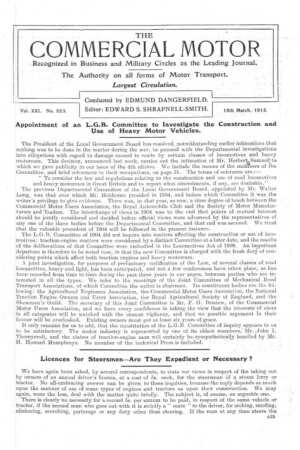COMMERCIAL MOTOR
Page 1

If you've noticed an error in this article please click here to report it so we can fix it.
Recognized in Business and Military. Circles as the Leading Journal.
The Authority on all forms of Motor Transport. Largest Circulation.
The President of the Local Government Board has resolved, notwithstanding earlier intimations that nothing was to be done in the matter during the war, to proceed with the Departmental investigations into allegations with regard to damage caused to roads by certain classes of locomotives and heavy motorcars. This decision, announced last week, carries out the intimation of Mr. HerbertA.Samua to which we gave publicity in our issue of the 4th ultimo, We include the names of the meElers of the Committee, and brief references to their occupations, on page 51. The terms of reference are:— " To consider the law and regulations relating to the construction and use of road locomotives and heavy motorcars in Great Britain and to report what amendments, if any, are desirable." The previous Departmental Committee of the Local Government Board, appointed by Mr. Walter Long, was that over which Mr. Hob.house presided in 1904, and before .which Committee it .was_ the writer's privilege to give evidence. There was, in that year, as now, a close degree of touch between the Commercial•Motor. Users Association, the .Royal Automobile Club and the Society. of Motor Manufacturers and Tralers. The interchange of views in 1904 was to the end that points of mutual interest should be jointly considered and decided before official views were advanced by the representatives of any one of. the three bodies before the Departmental Committee, and that end was secured. We trust that the valuable precedent of 1004 will be followed in the present instance. z The L.G.B. Committee of 1904 did not inquire into matters affecting the construction or use of locomotives: traction-engine matters were considered by a distinct Committee at a later date, and the results of the deliberations of that Committee were embodied in the Locomotives Act of 1898. An important departure is therefore to be noted now, in that the new Committee is 'charged with the fresh duty of con sidering pointS which affect both traction engines and heavy motorcars. . A joint investigation, for purposes of preliminary codification of the Law, of several classes of road locomotives, heavy and light, has been anticipated, and not a few conferences have taken place, as has been recorded from time tO tithe during the past _three years in our pages, between parties who are interested in all the types. We refer to the meetings of the Joint Committee of Mechanical Road Transport Associations, of which Committee the writer is chairman. Its constituent bodies are the following: the Agricultural Engineers Association, the Commercial Motor Users Association, the National Traction Engine Owners and Users Association, the Royal Agricultural Society of England, and the Showmen's Guild. The secretary of this joint Committee is Mr. F. G,Bristow, of the Commercial Motor Users Association, and we have every confidence in taking the view that the interests-of uSers in all categories will be watched with the utmost vigilancei. and that no possible argument in their favour will be overlooked. Existing owners must get at least six yearsof grace.
• It only remains for us to odd, that the "constitution of the L.G.B. Committee of inquiry appears to us to be satisfactory. The motor industry is represented by one of its oldest members,' Mr. John I. Thornycroft, and the claims of tract-ion-engine men will certainly be sympathetically handled by Mr. H. Howard Humphreys. No member of --the technical Press is included. .






















